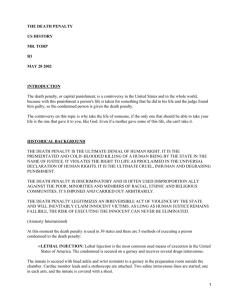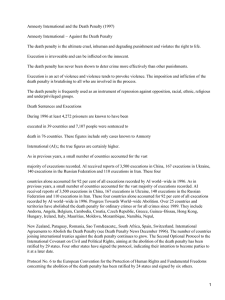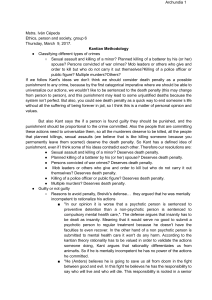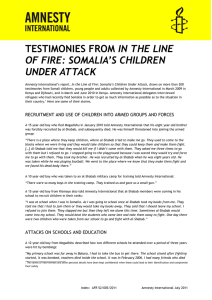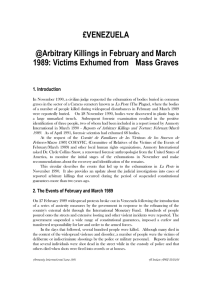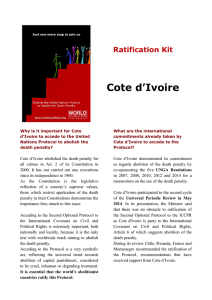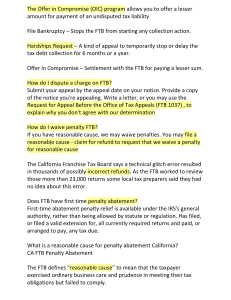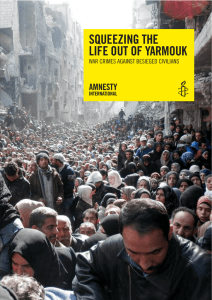The UNGASS on drugs outcome document must urge the respect
Anuncio
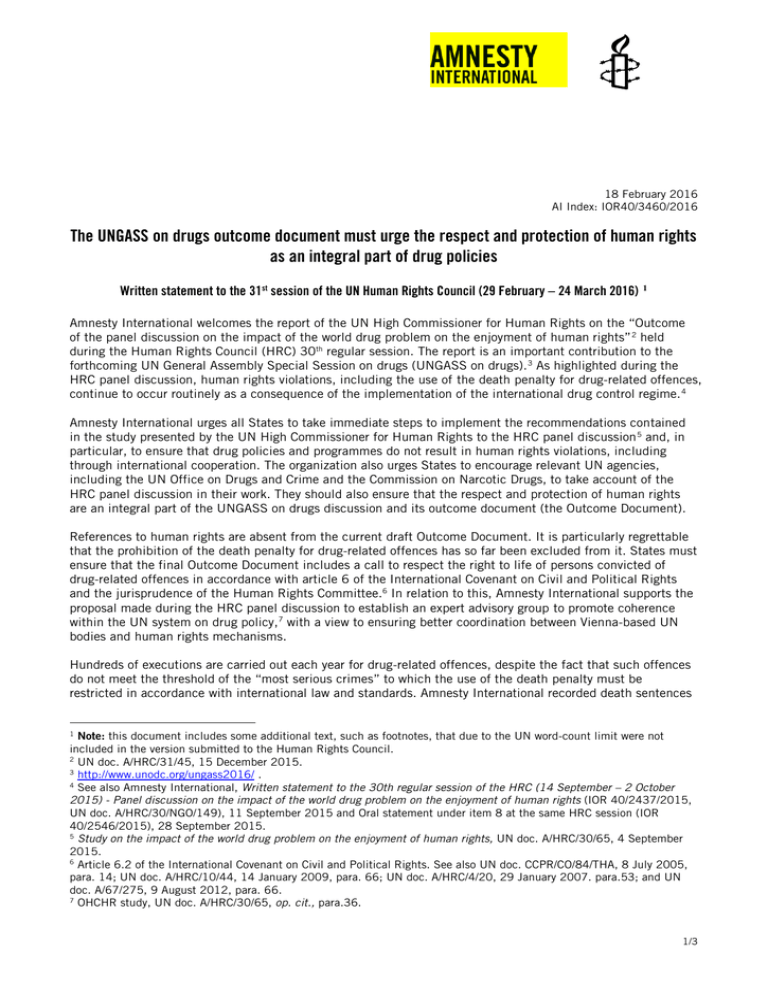
18 February 2016 AI Index: IOR40/3460/2016 The UNGASS on drugs outcome document must urge the respect and protection of human rights as an integral part of drug policies Written statement to the 31st session of the UN Human Rights Council (29 February – 24 March 2016) 1 Amnesty International welcomes the report of the UN High Commissioner for Human Rights on the “Outcome of the panel discussion on the impact of the world drug problem on the enjoyment of human rights” 2 held during the Human Rights Council (HRC) 30th regular session. The report is an important contribution to the forthcoming UN General Assembly Special Session on drugs (UNGASS on drugs). 3 As highlighted during the HRC panel discussion, human rights violations, including the use of the death penalty for drug-related offences, continue to occur routinely as a consequence of the implementation of the international drug control regime. 4 Amnesty International urges all States to take immediate steps to implement the recommendations contained in the study presented by the UN High Commissioner for Human Rights to the HRC panel discussion 5 and, in particular, to ensure that drug policies and programmes do not result in human rights violations, including through international cooperation. The organization also urges States to encourage relevant UN agencies, including the UN Office on Drugs and Crime and the Commission on Narcotic Drugs, to take account of the HRC panel discussion in their work. They should also ensure that the respect and protection of human rights are an integral part of the UNGASS on drugs discussion and its outcome document (the Outcome Document). References to human rights are absent from the current draft Outcome Document. It is particularly regrettable that the prohibition of the death penalty for drug-related offences has so far been excluded from it. States must ensure that the final Outcome Document includes a call to respect the right to life of persons convicted of drug-related offences in accordance with article 6 of the International Covenant on Civil and Political Rights and the jurisprudence of the Human Rights Committee.6 In relation to this, Amnesty International supports the proposal made during the HRC panel discussion to establish an expert advisory group to promote coherence within the UN system on drug policy,7 with a view to ensuring better coordination between Vienna-based UN bodies and human rights mechanisms. Hundreds of executions are carried out each year for drug-related offences, despite the fact that such offences do not meet the threshold of the “most serious crimes” to which the use of the death penalty must be restricted in accordance with international law and standards. Amnesty International recorded death sentences Note: this document includes some additional text, such as footnotes, that due to the UN word-count limit were not included in the version submitted to the Human Rights Council. 2 UN doc. A/HRC/31/45, 15 December 2015. 3 http://www.unodc.org/ungass2016/ . 4 See also Amnesty International, Written statement to the 30th regular session of the HRC (14 September – 2 October 2015) - Panel discussion on the impact of the world drug problem on the enjoyment of human rights (IOR 40/2437/2015, UN doc. A/HRC/30/NGO/149), 11 September 2015 and Oral statement under item 8 at the same HRC session (IOR 40/2546/2015), 28 September 2015. 5 Study on the impact of the world drug problem on the enjoyment of human rights, UN doc. A/HRC/30/65, 4 September 2015. 6 Article 6.2 of the International Covenant on Civil and Political Rights. See also UN doc. CCPR/CO/84/THA, 8 July 2005, para. 14; UN doc. A/HRC/10/44, 14 January 2009, para. 66; UN doc. A/HRC/4/20, 29 January 2007. para.53; and UN doc. A/67/275, 9 August 2012, para. 66. 7 OHCHR study, UN doc. A/HRC/30/65, op. cit., para.36. 1 1/3 and executions for drug-related offences in 11 countries in 2014 and in 2015.8 Drug-related offences are still punished or punishable by death in more than 30 countries.9 In several countries including Iran, Malaysia and Singapore,10 drug-related offences continue to be mandatorily punished by death despite the fact that mandatory death sentences, even for the most serious crimes, are contrary to international law.11 Credible evidence also indicated that in Iran, Janat Mir, who was below 18 years of age at the time of the crime, was executed for drug-related offences in 2014, in violation of international law and Iran’s human rights obligations. Human rights groups reported that another juvenile offender, Osman Dahmarde, was executed in the same year though the Iranian authorities have denied this. Amnesty International has also identified Mohammad Ali Zehi, who is currently at risk of being sentenced to death for drug-related offences in Iran, as a juvenile offender.12 In the great majority of cases that Amnesty International has been able to document, those facing the death penalty for drug-related offences have been persons from disadvantaged or marginalized socio-economic backgrounds, with no or little means to pay for legal assistance. 13 The lack of adequate legal assistance has not only exposed them to an increased risk of torture or other ill-treatment to extract “confessions” during investigations, but also resulted, in many cases, in defendants not benefitting from adequate legal representation, including in being unable to appeal against their death sentences and being executed following grossly unfair trials. Foreign nationals have also been at greater disadvantage before criminal justice systems in other countries and constitute a significant proportion of those sentenced to death and executed for drug-related offences.14 International law affords them the additional protections of consular and language assistances, but foreign nationals are often deprived of such protections in countries that still retain the death penalty. Consular assistance can be critical for defendants throughout the process, including in gathering evidence that could enable them to present mitigating factors at sentencing or when appealing for clemency. Amnesty International has documented numerous cases where the authorities have failed to correctly identify and notify consular officials of the arrest of their nationals and provide the accused with interpretation throughout the proceedings from the time of arrest. Discriminatory laws and practices have also resulted in foreign nationals not being able to make use of all avenues of appeal available to the country’s own nationals 15 and in their bodies not being returned to their families after the executions.16 China, Indonesia, Iran, Kuwait, Malaysia, Saudi Arabia, Singapore, Sri Lanka, Thailand, United Arab Emirates and Viet Nam. See also Amnesty International, Death sentences and executions in 2014 (ACT 50/001/2015), 31 March 2015, available at https://www.amnesty.org/en/documents/act50/0001/2015/en/ [Last accessed on 15 February 2016]. 9 This list covers offences that include drug trafficking resulting into death, drug trafficking not resulting into death, and drug trafficking by agents of the state. 10 While some sentencing discretion was introduced in Singapore under the Misuse of Drugs Act in 2012, defendants can still be mandatorily sentenced to death. 11 UN doc. CCPR/C/82/D/1110/2002, 8 December 2004, para. 5.2. 12 Amnesty International, Growing up on death row - The death penalty and juvenile offenders in Iran (MDE 13/3112/2016), January 2016, p.57, available at https://www.amnesty.org/en/documents/mde13/3112/2016/en/ [Last accessed on 15 February 2016] 13 See, for example, Amnesty International, Flawed justice - Unfair trials and the death penalty in Indonesia (ASA 21/2334/2015), October 2015, available at https://www.amnesty.org/en/documents/asa21/2434/2015/en/; Amnesty International, ‘Killing in the name of justice’ - The death penalty in Saudi Arabia (MDE 23/2092/2015), August 2015, available at https://www.amnesty.org/en/documents/mde23/2092/2015/en/; and Amnesty International, Growing up on death row - The death penalty and juvenile offenders in Iran (MDE 13/3112/2016), January 2016. [Last accessed on 15 February 2016] 14 See, for example, Amnesty International, Flawed justice-Unfair trials and the death penalty in Indonesia (ASA 21/2334/2015), pp.40-45; Amnesty International, ‘Killing in the name of justice’ - The death penalty in Saudi Arabia (MDE 23/2092/2015), pp.24-27. See also report of the Special Rapporteur on extrajudicial, summary or arbitrary executions, Christof Heyns, to the 70th Session of the General Assembly, UN doc. A/70/304, 7 August 2015. 8 See, for example, Amnesty International, Flawed justice-Unfair trials and the death penalty in Indonesia (ASA 21/2334/2015), p. 45. 16 See, for example, Amnesty International, Urgent Action 302/09-Saudi Arabia: further information-executed, body not returned to family (MDE 23/034/2014), 26 November 2014, available at https://www.amnesty.org/en/documents/mde23/034/2014/en/ . [Last accessed on 15 February 2016] 15 2/3 In addition to this, foreign nationals can find themselves at further disadvantage depending on whether or not the country of nationality provides consular assistance and the effectiveness of any consular assistance provided. The availability and quality of consular assistance can vary according to the status of the death penalty in their country of nationality; the political agenda and willingness to intervene of the government of their country; as well as the resources available to the relevant foreign representation to assist and advocate for nationals facing the death penalty abroad. Therefore, the nationality of the defendants can become a factor directly affecting the ability of persons to defend themselves and the outcome of death penalty cases, which can render the execution arbitrary.17 This is not only because the imposition of the death penalty where the proceedings do not adhere to the highest standards of fair trial constitutes arbitrary deprivation of life, 18 and governments that fail to make all efforts to provide effective assistance to their nationals abroad bear some of the responsibility for the outcome of the case; but also because there is an additional element of arbitrariness depending on the extent to which particular countries intervene in support of their own nationals facing the death penalty abroad, with an individual’s specific nationality becoming an additional significant factor in determining their fate in the lethal lottery of the death penalty. The lack of transparency in the use of the death penalty in several countries has exacerbated the risk of fair trial violations, including in the cases of foreign nationals, and the suffering of their relatives. It also makes the monitoring of the use of the death penalty challenging and prevents a fully informed national debate on abolition. Amnesty International has been repeatedly contacted by family members of persons under sentence of death in other countries who were unable to ascertain how the legal proceedings against their relatives were evolving, could not support them with the preparation of their cases and did not receive assistance from the relevant consulate.19 In some cases family members learned about the execution of their relative through the media and did not receive his or her body for burial.20 Recommendations Amnesty International calls on States that still use the death penalty to: immediately establish a moratorium on executions and abolish the death penalty in national legislation; pending full abolition, bring provisions in national legislation that allow for the use of the death penalty in line with international law and standards, including by removing from the scope of the death penalty any offence other than intentional killing; review all cases where people have been sentenced to death with a view to commuting the death sentences. In particular in all cases where the death penalty has been imposed for drug-related offences or where the trial did not meet the most rigorous international fair trial standards, or in cases where the procedures were seriously flawed, offer a retrial that fully complies with international fair trial standards and that does not resort to the death penalty. The organization further calls on all States to: ensure that their criminal justice system is adequately resourced so that the most rigorous internationally recognized standards for fair trial are respected, particularly in proceedings where the death penalty might be imposed; ensure that consular representation is readily available, adequately resourced and effective; use the UNGASS on drugs to reaffirm their commitment to the protection of human dignity and ensure that human rights violations committed in the name of international drug control regime are halted. The engagement of countries in this issue has been varied. See UN doc. A/70/304, op. cit., para.108. See report of the Special Rapporteur on extrajudicial, summary or arbitrary executions, Christof Heyns, to the 67th Session of the General Assembly, UN doc. A/67/275, 9 August 2012, para.25. 19 Information on file with Amnesty International. 20 See, for example, Amnesty International, Urgent Action 302/09 - Saudi Arabia: further information-executed, body not returned to family (MDE 23/034/2014). 17 18 3/3
